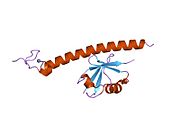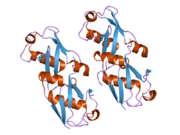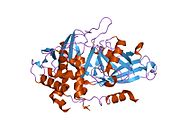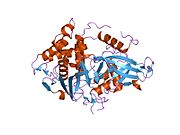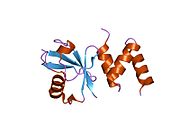Ubiquitin B: Difference between revisions
m ISBNs (Build KG) |
clarified the topic sentence |
||
| Line 4: | Line 4: | ||
== Function == |
== Function == |
||
Ubiquitin |
Ubiquitin is one of the most conserved proteins known in eukaryotic organisms. Ubiquitin is required for [[Adenosine triphosphate|ATP]]-dependent, non-[[lysosome|lysosomal]] intracellular protein degradation of abnormal proteins and normal proteins with a rapid turnover. Ubiquitin is covalently bound to proteins to be degraded, and presumably labels these proteins for degradation. Ubiquitin also binds to [[histone H2A]] in actively transcribed regions but does not cause histone H2A degradation, suggesting that ubiquitin is also involved in regulation of gene expression. This gene consists of three direct repeats of the ubiquitin coding sequence with no spacer sequence. Consequently, the protein is expressed as a polyubiquitin precursor with a final amino acid after the last repeat. Aberrant form of this protein ([[UBB+1]]) has been noticed in patients with [[Alzheimer's disease]], [[Down syndrome]], other [[tauopathy|tauopathies]] (e.g. [[Pick's disease]]) and [[trinucleotide repeat disorder|polyglutamine disease]] (e.g. [[Huntington's disease]])<ref name="pmid14597671">{{cite journal | author = Fischer DF, De Vos RA, Van Dijk R, De Vrij FM, Proper EA, Sonnemans MA, Verhage MC, Sluijs JA, Hobo B, Zouambia M, Steur EN, Kamphorst W, Hol EM, Van Leeuwen FW | title = Disease-specific accumulation of mutant ubiquitin as a marker for proteasomal dysfunction in the brain | journal = FASEB J | volume = 17 | issue = 14 | pages = 2014–2024 | year = 2003 | month = Nov | pmid = 14597671| pmc = | doi =10.1096/fj.03-0205com }}</ref>.<ref>{{cite web | title = Entrez Gene: UBB ubiquitin B| url = http://www.ncbi.nlm.nih.gov/sites/entrez?Db=gene&Cmd=ShowDetailView&TermToSearch=7314| accessdate = }}</ref> |
||
==References== |
==References== |
||
Revision as of 19:04, 12 October 2012
Template:PBB Ubiquitin is a protein that in humans is encoded by the UBB gene.[1]
Function
Ubiquitin is one of the most conserved proteins known in eukaryotic organisms. Ubiquitin is required for ATP-dependent, non-lysosomal intracellular protein degradation of abnormal proteins and normal proteins with a rapid turnover. Ubiquitin is covalently bound to proteins to be degraded, and presumably labels these proteins for degradation. Ubiquitin also binds to histone H2A in actively transcribed regions but does not cause histone H2A degradation, suggesting that ubiquitin is also involved in regulation of gene expression. This gene consists of three direct repeats of the ubiquitin coding sequence with no spacer sequence. Consequently, the protein is expressed as a polyubiquitin precursor with a final amino acid after the last repeat. Aberrant form of this protein (UBB+1) has been noticed in patients with Alzheimer's disease, Down syndrome, other tauopathies (e.g. Pick's disease) and polyglutamine disease (e.g. Huntington's disease)[2].[3]
References
- ^ Webb GC, Baker RT, Fagan K, Board PG (1990). "Localization of the human UbB polyubiquitin gene to chromosome band 17p11.1-17p12". Am J Hum Genet. 46 (2): 308–15. PMC 1684968. PMID 2154095.
{{cite journal}}: Unknown parameter|month=ignored (help)CS1 maint: multiple names: authors list (link) - ^ Fischer DF, De Vos RA, Van Dijk R, De Vrij FM, Proper EA, Sonnemans MA, Verhage MC, Sluijs JA, Hobo B, Zouambia M, Steur EN, Kamphorst W, Hol EM, Van Leeuwen FW (2003). "Disease-specific accumulation of mutant ubiquitin as a marker for proteasomal dysfunction in the brain". FASEB J. 17 (14): 2014–2024. doi:10.1096/fj.03-0205com. PMID 14597671.
{{cite journal}}: Unknown parameter|month=ignored (help)CS1 maint: multiple names: authors list (link) CS1 maint: unflagged free DOI (link) - ^ "Entrez Gene: UBB ubiquitin B".
Further reading
- Conaway RC, Brower CS, Conaway JW (2002). "Emerging roles of ubiquitin in transcription regulation". Science. 296 (5571): 1254–1258. doi:10.1126/science.1067466. PMID 12016299.
{{cite journal}}: CS1 maint: multiple names: authors list (link) - Murphey RK, Godenschwege TA (2002). "New roles for ubiquitin in the assembly and function of neuronal circuits". Neuron. 36 (1): 5–8. doi:10.1016/S0896-6273(02)00943-1. PMID 12367500.
- Mazzé FM, Degrève L (2006). "The role of viral and cellular proteins in the budding of human immunodeficiency virus". Acta Virol. 50 (2): 75–85. PMID 16808324.
- Schlesinger DH, Goldstein G (1975). "Hybrid troponin reconstituted from vertebrate and arthropod subunits". Nature. 255 (5507): 423–4. doi:10.1038/255424a0. PMID 124018.
- Adams SM; Sharp MG; Walker RA; et al. (1992). "Differential expression of translation-associated genes in benign and malignant human breast tumours". Br. J. Cancer. 65 (1): 65–71. doi:10.1038/bjc.1992.12. PMC 1977345. PMID 1370760.
{{cite journal}}: Unknown parameter|author-separator=ignored (help) - Pancré V; Pierce RJ; Fournier F; et al. (1991). "Effect of ubiquitin on platelet functions: possible identity with platelet activity suppressive lymphokine (PASL)". Eur. J. Immunol. 21 (11): 2735–41. doi:10.1002/eji.1830211113. PMID 1657614.
{{cite journal}}: Unknown parameter|author-separator=ignored (help) - Baker RT, Board PG (1991). "The human ubiquitin-52 amino acid fusion protein gene shares several structural features with mammalian ribosomal protein genes". Nucleic Acids Res. 19 (5): 1035–1040. doi:10.1093/nar/19.5.1035. PMC 333777. PMID 1850507.
- Fornace AJ, Alamo I, Hollander MC, Lamoreaux E (1989). "Ubiquitin mRNA is a major stress-induced transcript in mammalian cells". Nucleic Acids Res. 17 (3): 1215–1230. doi:10.1093/nar/17.3.1215. PMC 331738. PMID 2537950.
{{cite journal}}: CS1 maint: multiple names: authors list (link) - Lund PK; Moats-Staats BM; Simmons JG; et al. (1985). "Nucleotide sequence analysis of a cDNA encoding human ubiquitin reveals that ubiquitin is synthesized as a precursor". J. Biol. Chem. 260 (12): 7609–13. PMID 2581967.
{{cite journal}}: Unknown parameter|author-separator=ignored (help) - Einspanier R, Sharma HS, Scheit KH (1987). "Cloning and sequence analysis of a cDNA encoding poly-ubiquitin in human ovarian granulosa cells". Biochem. Biophys. Res. Commun. 147 (2): 581–587. doi:10.1016/0006-291X(87)90970-3. PMID 2820408.
{{cite journal}}: CS1 maint: multiple names: authors list (link) - Wiborg O; Pedersen MS; Wind A; et al. (1985). "The human ubiquitin multigene family: some genes contain multiple directly repeated ubiquitin coding sequences". EMBO J. 4 (3): 755–9. PMC 554252. PMID 2988935.
{{cite journal}}: Unknown parameter|author-separator=ignored (help) - Baker RT, Board PG (1987). "The human ubiquitin gene family: structure of a gene and pseudogenes from the Ub B subfamily". Nucleic Acids Res. 15 (2): 443–463. doi:10.1093/nar/15.2.443. PMC 340445. PMID 3029682.
- Vijay-Kumar S, Bugg CE, Cook WJ (1987). "Structure of ubiquitin refined at 1.8 A resolution". J. Mol. Biol. 194 (3): 531–544. doi:10.1016/0022-2836(87)90679-6. PMID 3041007.
{{cite journal}}: CS1 maint: multiple names: authors list (link) - Busch H (1984). "Ubiquitination of proteins". Meth. Enzymol. Methods in Enzymology. 106: 238–262. doi:10.1016/0076-6879(84)06025-0. ISBN 978-0-12-182006-0. PMID 6092831.
{{cite journal}}:|chapter=ignored (help) - Andersen MW, Ballal NR, Goldknopf IL, Busch H (1981). "Protein A24 lyase activity in nucleoli of thioacetamide-treated rat liver releases histone 2A and ubiquitin from conjugated protein A24". Biochemistry. 20 (5): 1100–1104. doi:10.1021/bi00508a009. PMID 6261785.
{{cite journal}}: CS1 maint: multiple names: authors list (link) - Busch H, Goldknopf IL (1982). "Ubiquitin - protein conjugates". Mol. Cell. Biochem. 40 (3): 173–87. PMID 6275256.
- Treier M, Staszewski LM, Bohmann D (1994). "Ubiquitin-dependent c-Jun degradation in vivo is mediated by the delta domain". Cell. 78 (5): 787–798. doi:10.1016/S0092-8674(94)90502-9. PMID 8087846.
{{cite journal}}: CS1 maint: multiple names: authors list (link) - Cook WJ, Jeffrey LC, Kasperek E, Pickart CM (1994). "Structure of tetraubiquitin shows how multiubiquitin chains can be formed". J. Mol. Biol. 236 (2): 601–609. doi:10.1006/jmbi.1994.1169. PMID 8107144.
{{cite journal}}: CS1 maint: multiple names: authors list (link) - Ramage R; Green J; Muir TW; et al. (1994). "Synthetic, structural and biological studies of the ubiquitin system: the total chemical synthesis of ubiquitin". Biochem. J. 299 (1): 151–8. PMC 1138034. PMID 8166633.
{{cite journal}}: Unknown parameter|author-separator=ignored (help)


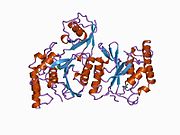
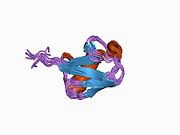

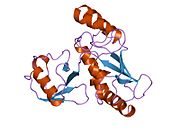
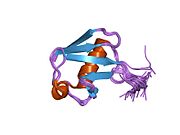

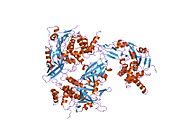





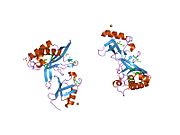

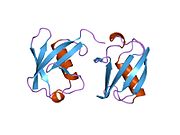
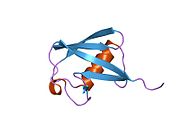

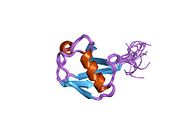




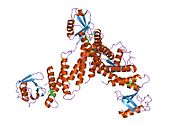

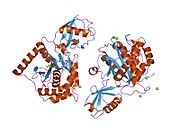



![1yj1: X-ray Crystal Structure of a Chemically Synthesized [D-Gln35]Ubiquitin](http://upload.wikimedia.org/wikipedia/commons/thumb/f/f5/PDB_1yj1_EBI.jpg/180px-PDB_1yj1_EBI.jpg)

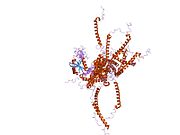



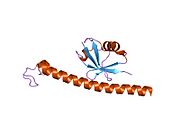

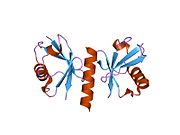

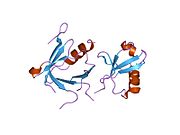
![2fcm: X-ray Crystal Structure of a Chemically Synthesized [D-Gln35]Ubiquitin with a Cubic Space Group](http://upload.wikimedia.org/wikipedia/commons/thumb/1/1a/PDB_2fcm_EBI.jpg/180px-PDB_2fcm_EBI.jpg)
![2fcn: X-ray Crystal Structure of a Chemically Synthesized [D-Val35]Ubiquitin with a Cubic Space Group](http://upload.wikimedia.org/wikipedia/commons/thumb/d/d8/PDB_2fcn_EBI.jpg/180px-PDB_2fcn_EBI.jpg)

![2fcs: X-ray Crystal Structure of a Chemically Synthesized [L-Gln35]Ubiquitin with a Cubic Space Group](http://upload.wikimedia.org/wikipedia/commons/thumb/e/e6/PDB_2fcs_EBI.jpg/180px-PDB_2fcs_EBI.jpg)
